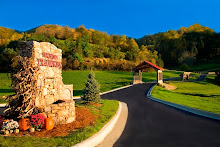Some encouraging signs that the real estate market in North Carolina is starting to rebound: getting more traffic to your website, more calls to your welcome center (not merely asking for directions to the nearest Starbucks), people coming out to tour your community...
And finally, someone actually purchasing a home or homesite. Yahoo! Ring that bell! Pavlov's dog is salivating! It's a great day in the neighborhood. You get my drift.
I would like you to meet Paul and Cindy Anderson, our first homowners at Mountain Traditions. The Andersons are from Weaverville, North Carolina, "just down the road a piece". Paul has several businesses around Western North Carolina. They visited the model home during the Asheville Home Builders Association (HBA) Parade of Homes tour last fall. Cindy and Paul loved the model so much that they not only purchased the home, but all the furnishings, right down to the linens and coffee maker.
“We enjoy incredible country living here, and we’re only 20 minutes from Asheville,” said Cindy in a recent interview. “I can’t wait to return to my new ‘peace and quiet’ after work every day!”
The Anderson’s home is positioned “just so” to delight in the morning sunrise from one porch and the evening sunset from another. “Our view of stars in the night sky is spectacular,” Cindy commented. “We see so many more here than we did when we lived within the glare of city lights.”
Just as we had hoped, Paul and Cindy are taking advantage of our scenic walking trails, fishing pond, and soon the newly restored 1800s cabin-turned-clubhouse scheduled to open in June.
“Why wouldn’t we?” asked Paul. “It’s beautiful here. We’re thrilled to experience a tranquil lifestyle with city amenities nearby. We wouldn’t change a thing!”
Check out the 2009 Parade Home on the Mountain Traditions website. We're finishing up on the 2010 Parade Home and I'll write about that one in the very near future. You may also want to check out other homestyles and floorplans. You'll find that here is an eclectic array of floorplan choices. Here, at Mountain Traditions, you may bring your own builder or choose from one of our custom builders; and you can build now or later.
Ok, here's the 15-second commercial: Mountain Traditions is a beautiful 400-acre mountain community just 20 minutes north of Asheville in the quaint college town of Mars Hill. Mountain Traditions offers homesites ranging from one to over four acres and valued from the $100s to $400s. Amenities include walking trails, fish pond, overlooks and natural parks and a restored 1800s cabin that serves as the clubhouse overlooking the neighborhood pond. This debt free community is being developed by Jud Ammons, who grew up in Mars Hill and where his family still has deep roots. Visit our website MountainTraditionsNC.com.






